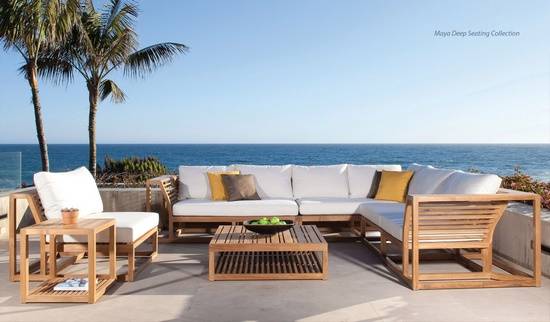It was around 9:30 PM on Friday, August 16, 1968 when these three notes—B, G#, E—played on his iconic white Fender Stratocaster guitar—rang out across a rain-soaked sea of concert goers at the recently opened, 40-acre, 20,000 capacity Merriweather Post Pavilion amphitheater in Columbia, Maryland. This was the last song in a storm-defying and, to this day, legendary concert by the late Jimi Hendrix.


Despite menacing weather conditions, the concert began shortly after 8:30 PM with England’s Soft Machine jazz/rock band as the opening act. By the time Hendrix hit the stage it was under dark, ominous skies that soon dumped a deluge of heavy rains down upon the throng of Hendrix fans spread out beyond the covered seating and rising up across the open lawn of the outdoor amphitheater. Many in attendance actually reported that a lightning bolt ripped loose out of the clouds the very moment Hendrix took to the stage. An omen, perhaps, of the performance to follow?
The rains were so bad that most attendees who were seated out in the open tried to pack themselves down closer to the stage under the Pavilion’s covered seating section. And, although that section was limited to higher-paying patrons, Hendrix pleaded with officials to let the audience squeeze closer together down towards the front.
For the next 45 minutes, Hendrix seemed to literally go to war with the storm in an electric feedback-driven defiance against threatening thunder and relentless rain. His set began with “Are You Experienced” followed by “Rock Me Baby”, “Foxy Lady”, “Hey Joe”, “Fire”, “I Don't Live Today”, “Purple Haze” and “Wild Thing”. Then…those three notes. Those three notes broke the air. They silenced the storm. They silenced the crowd.
Those three notes—B, G#, E—that Hendrix struck in descending order and with raw commitment—are almost immediately recognizable to most Americans as the opening of “The Star Spangled Banner”. They soared like blazing “rockets’ red glare” across the dark, overcast sky exploding from within the raging guitar riffs from Hendrix’s version of the Troggs’ earlier hit single, “Wild Thing”. And, in those moments, that storm’s roaring thunder and that screaming crowd became solemnly hushed.
It was, after all, in the midst of the Vietnam War years. And, like many of that time, Hendrix—who had been a disgruntled and, ultimately, discharged soldier in the Army’s 101st Airborne Division—used his Stratocaster to vent his protest of the war. And that strained version of America’s National Anthem soon became the “anthem of protest” for many of his generation and that era. (Footnote: This was Hendrix’s first public performance of his controversial The Star Spangled Banner.)
Almost a year to date later, Monday morning, August 18, 1969, from 9AM to 11:10AM, Hendrix again blew away the dwindling crowd of mud-soaked, weather-beaten Woodstock early risers with his closing performance; calling morning reveille with those same haunting three notes before launching into a two-hour set. Then, a mere one year and one month later, Hendrix joined a tragically growing list of contemporary rock stars who, all-too-soon, succumbed to a drug overdose and became rock history’s lost legends long before their time.




But, on that night, during that August 16, 1968 Merriweather Post Pavilion performance, Hendrix delivered an unforgettable experience, an unforgettable night and one of many unforgettable concerts to follow within a 50+year legacy of record-breaking pop/rock shows at this renowned Columbia, Maryland amphitheater; a venue crowned the second most favorite in the nation by Billboard Magazine in 2010 and the fourth best by Rolling Stone in 2013.

Over the past 50+ years, Columbia’s Merriweather Post Pavilion has boasted a continuous stream of star-studded concerts from Janis Joplin to Willie Nelson, Led Zeppelin, Stevie Wonder, Aretha Franklin, David Bowie, Whitney Houston, the Grateful Dead, Metallica, Wu-Tang Clan, Pearl Jam, Blood Sweat & Tears, Radiohead, Kanye West, Jackson Brown, Jimmy Buffett, Chicago, Gladys Knight and the Pips, Tom Jones, John Denver, the Carpenters, Ella Fitzgerald, Johnny Mathis, ELO, King Crimson, the Beach Boys, the Guess Who, Pink Floyd, Glenn Campbell, Arlo Guthrie, Miles Davis, Muddy Waters, Al Green etc. And—in both 2008 and back again in 2022—Led Zeppelin's Robert Plant and pop/country/bluegrass star Alison Krauss took the stage to sell-out crowds. To this day, if you’re on your way up or have made it bigtime, your tour itinerary must include this venue.




Ironically, the famous Merriweather Post Pavilion amphitheater was initially called the Columbia Pavilion of Music and was intended to host the National Symphony. In fact, its opening night on July 14, 1967 had Van Cliburn and the National Symphony Orchestra scheduled to perform. But rain started an hour before their performance and the show was canceled. After further attempts to brand it as a classical music and theater venue, it was soon renamed after heiress Marjorie Merriweather Post and, as noted above, became “the must play” outdoor venue for pop and rock musicians of the 60’s and beyond.
Post was the heiress to and-following her father’s death in 1914-the owner of the Postum Cereal Company which later became the General Foods Corporation. She was a business icon, a philanthropist, an art and jewelry collector and an internationally famous socialite. Post was married and divorced four times; the second being to future investment banker financial tycoon, E.F. Hutton. It was during her marriage to Hutton that the company began to acquire Hellmann’s Mayonnaise, Jell-O, Baker’s Chocolate, Maxwell House and-in latter years-Birds Eye, plus many more American food companies.



The story goes that the name change from the Columbia Pavilion of Music to the Merriweather Post Pavilion was in anticipation of a large donation from Post, herself, to the amphitheater; a donation that, as some reported, was never actually received.
But the name has remained and has since been adopted in part by the newly renovated and renamed Merriweather Lakehouse Hotel™, a Marriott Autograph Collection Hotel, which reopened its doors in November, 2021. It is a short walk from the Merriweather Post Pavilion and is more than worthy of its namesake plus the rich cultural heritage of Columbia. Rising in stately fashion above the banks of picturesque Lake Kittamaqundi in Columbia Town Center, this re-imagined and re-christened 212-room pet-friendly hotel—with its 78-room addition, rooftop pool overlooking the lake and a luxurious top floor penthouse suite complete with a grand piano—blends perfectly within its lush, tree-filled seven-acre landscape; and features a new modern, copper patina façade that reflects all the refreshing charm of its garden-like lakefront setting.




From almost any view, the lake is an ever-present feature of the Merriweather Lakehouse Hotel™ …as if intentionally created to enhance the ambiance and experience for hotel guests. Expansive floor-to-ceiling windows and doorways which open out to expansive patios virtually bring the lake inside for guests to experience. The newly re-designed lobby also offers a wide view of the lake and features an inviting brick fireplace. The lobby and hallways present an historical poster and pictorial display of famous artists who have performed at the Merriweather Post Pavilion. The village’s own beautifully landscaped and night-lit wooden ramp slopes gently down from the hotel’s surrounds to a lake dock. To all appearances, it would seem to be an actual extension of the hotel and provides guests a serene sanctuary along the water’s edge.



Both inside and out, the color and texture themes throughout the hotel reflect its nature-rich waterfront location. Clean lines, blue, aqua-marine and warm gray tones create an ever-fresh atmosphere to accent wood trims, furnishings and flooring.



A generous use of elegant teak furnishings—both upholstered and not—from Westminster Teak’s Horizon and Laguna selections grace the large outdoor patio off the hotel’s Lāk restaurant, the ballroom patio plus lounging areas, giving a natural and extra warm ambiance and comfort to those settings.


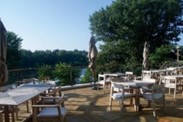

The decision to go with Westminster Teak turned out to be a fortunate choice; especially since the hotel’s renovation process was also during a supply chain-starved pandemic. “Quite frankly, we needed patio furniture ASAP”, explained hotel owner, David Costello. “When we Googled teak furnishings, Westminster Teak came up and their products looked amazing. But the real clincher was their salesperson, Shelley TenBroeck. Super professional, super accommodating, no pressure, very responsive and none of this would have happened without her professionalism. We were desperate for furniture during COVID when you could literally get nothing (everything was stuck on a ship coming from abroad). Westminster Teak has been fantastic. I really cannot say enough good things about their people and their products except we’re planning on adding more pieces soon and… All our guests love it…”
The appreciation for preservation of Columbia’s natural scenic beauty and local wildlife is easily apparent in the hotel’s own design. Guests will find wide use of artwork featuring local nature scenes and wildlife murals created by the community’s own artists. And, to carry those themes further, the Merriweather Lakehouse Hotel has named its four food and beverage facilities after local bird habitats; i.e. The Rookery Bar and Lounge, the Osprey Café (with its own pastry chef), the rooftop Eagle Watch bar and, of course, the hotel’s Lāk Restaurant. (It’s pronounced “lake”.)




Both the Lāk Restaurant and its head Chef, Adam Harper, are amazing contributions to the hotel’s luxurious yet comfortable amenities. Harper, formerly of the area’s popular Iron Bridge Wine Company and Mad Chef Kitchen & Bar, is an award-winning, master Chef whose culinary team brings a classic American oriented menu of locally inspired farm-to-table, made-from-scratch dishes to hotel guests and locals looking for an upscale dining experience.
And that same team brings their culinary skills to create custom menus for the hotel’s meetings and special event guests.





Whether indoors or outdoors, corporate board meetings, holiday events, group retreats and reunions or lakeside weddings and cocktail parties…all are easily accommodated by the hotel’s greatly expanded events, ballroom and meeting spaces complete with a professional A/V department.


And, if you’re looking for the best in fitness accommodations, the hotel’s 24-hour ultra-professional fitness center features Peloton bikes, Life Fitness cardio equipment and premium Elevation Series equipment. Or, if you’re looking for total relaxation and a little pampering, you can visit the nearby Pearl Spa courtesy of one of several curated guest amenity packages.


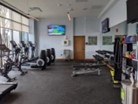
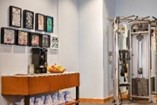
The hotel’s branding as a Marriott Autograph Collection travel destination is worthy of considerable notoriety as the Marriott Autograph signification is somewhat rare on a global scale; and the requirements for achieving that distinction are very strict. Borrowing from the Marriot Corporation’s language, “Autograph Collection Hotels brings the art of storytelling to life by hand selecting hotels that are rich in craft and character, design, architecture and unexpected back-stories….Every Autograph Collection hotel celebrates artistry that surprises, inspires and delights and experiences that are exactly like nothing else.”
So, aside from the design, architecture, ambiance, amenities and upscale hospitality services offered, what helps qualify this particular hotel for the Autograph Collection brand? For that, we need a little history: The original hotel facility was called the Cross Keys Inn. It later became the Columbia Inn. That was followed by its previous brand, the Sheraton Columbia Tower. Today, it’s the Merriweather Lakehouse Hotel with a Marriott Autograph certification. And—no surprise—the hotel’s owners especially wanted to associate their new name and their brand of upscale hospitality with Columbia’s historically legendary Merriweather Post Pavilion.

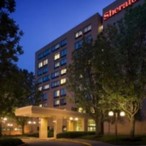
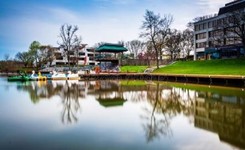
But, to fully appreciate the relationship between the Merriweather Lakehouse Hotel, its nearby Merriweather Post Pavilion and the community of Columbia, it helps to have a little background of this community as a whole and the vision behind its creation. It all started with a radical idea for a unique planned community by one James W. Rouse (1914-1996).
A developer by trade, a philanthropist by choice and a visionary by nature, Rouse began stirring up noise as far back as 1959 when, in a speech to area civic leaders and fellow developers, he broke the mold for current city and suburban planners and proposed that the essential purpose for any city planning should be for the welfare of its people and not merely for the glory of economic expansion and engineering mastery.
His vision was to create a city of neighborhoods where all people—men, women, families and businesses—could live, work, play and, above all, grow together in character, brotherhood, individuality, religious freedom, and experience the true joy of life; all without regard to race, creed or social status.
That was, indeed, a rather radical—if not, utopian—concept in 1959. In fact, it was a 1933 utopia-themed piece of literature called Lost Horizon by British author James Hilton about a mythical world named Shangri-La that helped inspire Rouse. So much so that, in 1962, “Shangri-La” became Rouse’s secret code name for what was to become his ideal community. And on June 21, 1967, Rouse’s vision became a reality. That date marked the official grand opening of a 32+ square mile community of self-sustaining neighborhoods within one big neighborhood called Columbia, Maryland.
Rouse’s guiding principle behind his plan for Columbia was to create “a garden for growing people”. That principle was crystalized in his slogan, “Better Living By Design”. And to his credit, that guiding principle and his vision for this utopian-type community ultimately resulted in Rouse being presented with the Medal of Freedom by President Clinton in 1995; one year before Rouse passed.

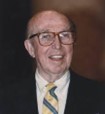
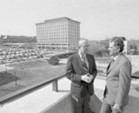
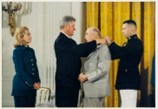
Columbia It is strategically located in central Maryland about 20 miles southwest of Baltimore, some 25 miles northeast of Washington, D.C. and a good 30 miles northwest of Annapolis. Before he settled on the Maryland site for his ideal community, Rouse had explored possible locations in Atlanta, Georgia and Raleigh/Durham, North Carolina. But Maryland’s Howard County seemed to be more centrally located within the eastern seaboard of the United States and well-placed near the nation’s Capitol and it’s immediately surrounding cities of Baltimore and Annapolis.
Along with its emphasis on the “human values” side of life, the impressive development plan of Columbia was certainly a comprehensive engineering feat, especially given its origins some 55 years ago. It was ingeniously designed to create ten distinct—yet, conceptually integrated—self-contained villages. They included (in order of establishment): Wilde Lake, Harper’s Choice, Oakland Mills, Long Reach, Owen Brown, Town Center, Hickory Ridge, Kings Contrivance, Dorsey’s Search and River Hill. Wilde Lake was established in 1967 while River Hill wasn’t finalized until 1990.
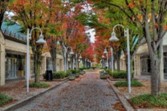
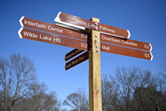
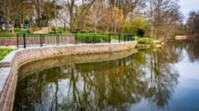

The master plan called for each of the ten villages to be made up of multiple complete and distinctively named neighborhoods named after famous poets, novelists, artists or elements of nature. Various neighborhood street names were taken from famous works of art and literature.
As an example, the Hobbit's Glen neighborhood takes its street names from the works of J. R. R. Tolkien. The Running Brook neighborhood street name came from Robert Frost’s poetry. And, as you might guess, the Clemens Crossing neighborhood street names were fashioned after the works of Samuel L. Clemons, a.k.a. Mark Twain. The decision to use well-known works of literature in the naming of certain village streets hints at how important it was to Rouse to reflect a strong cultural influence within the spirit of the community.
Villages were designed to include schools, shopping centers, recreational and major sports facilities, medical services, a community center, concert theater halls, walking and biking trails and a range of housing choices. Many of these neighborhoods feature single-family homes, townhomes, condominiums as well as apartments. To accommodate differing income brackets, some sections were a little more upscale than others, yet none would be considered “low end”.
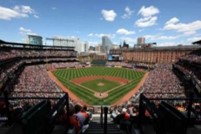

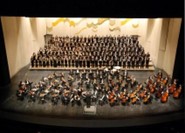
All of these built-in services and facilities were also intended to create well-paying jobs for many of the community’s residents. Four of the villages were intended to have interfaith centers or common worship facilities which were to be owned and jointly operated by a variety of religious congregations working together.
The Downtown Columbia Plan included sustainability features with plans for saving water and energy, and for ecology and livability. Ironically, Columbia has never been incorporated. However, some governance is provided by the non-profit Columbia Association. A type of Homeowners Association, this group manages the common areas and sets the guidelines for private properties.

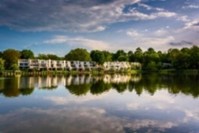
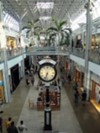
Vital to the preservation of nature and the enrichment of the community’s aesthetics was the creation of three large and picturesque manmade lakes. These include the 37-acre Lake Elkhorn, the 22-acre Wilde Lake and the 27-acre Lake Kittamaqundi (named for the first Native-American settlement in Howard County. The name translates to “meeting place”).
It is Lake Kittamaqundi that runs through the central heart of Columbia and shares the site of the community’s original Town Center/Columbia Mall…where also rests the newly renovated Merriweather Lakehouse Hotel.
So, that brings us full circle back to the question of how and why this Merriweather Lakehouse Hotel merits the status of a Marriott Autograph Collection facility. Its backstory shows it to be at the center of and a driving force for the fulfillment of Rouse’s vision for Columbia. Its pivotal role in the early development stages of the community, its contribution towards giving the community a sense of purpose and its embrace of Rouse’s vision for a culturally rich lifestyle all find common expression in the Merriweather Lakehouse Hotel. In many ways, it’s more than an upscale 4-star hotel, it’s truly reflective of Columbia’s spirit…and especially now with its recent renovations.
According to hotel owner, Costello, “We grew up in this community and have strong ties to its vision and values. So, our goal was to bring the facility up to date, enhance amenities and create an environment that compliments both the history and the evolution of this very unique Columbia community…all the while assuring an especially enjoyable and memorable experience for our hotel guests.”
“We bought the hotel along with a piece of property adjacent to it in 2018 and decided to embark on a major $30 million remodeling and rebranding project of the existing Sheraton Hotel,” notes Costello. “Our original intention was to renovate and stay open. But the Covid pandemic forced us to close the hotel. The renovation took a full 18 months with our official opening in November 2021. In the tradition of our neighbor, the Merriweather Post Pavilion, our grand opening event featured music recording and performing star, Citizen Cope.”
Citizen Cope (born Clarence Greenwood) is, of course, a famous singer/songwriter who performs nationally and whose songs have been covered by music superstars like Sheryl Crow, Richie Havens, Rhymefest and Carlos Santana. In fact, Cope can be heard playing his song, “Sideways”, along with Carlos on Santana’s “Shaman” album. He’s even shared the stage with the likes of Eric Clapton. Though Memphis born, he was raised primarily in nearby Washington, D.C. So, his appearance at the grand opening of neighboring Columbia’s new Merriweather Lakehouse Hotel seemed all the more fitting.

According to Costello, the connection between big name musicians and their hotel dates way back to its earliest roots. While performing at the Merriweather Post Pavilion, the hotel—in all its incarnations—has played host to many music, acting and public celebrity guests. There’s even the story of Jackson Brown (“Doctor My Eyes”) writing and recording his hit, “The Road”, in room 301 during his 1977 stay. And, to this day, hotel guests are likely to spot various celebrities coming and going from the hotel while performing at the Merriweather Post Pavilion.
“Our hotel is just close enough to the Pavilion that—if you’re outside on our large patio, lawn or rooftop pool—you can often hear the concert in the distance, even though you may not be able to really make out the actual song,” notes Costello. “The Pavilion venue is actually very walkable, and many people opt to park in nearby areas and walk the short remaining way. Plus, we do offer a VIP concert package along with a shuttle service to our guests for all concerts. And we typically have a happy hour special in our Rookery Bar related to whomever is performing there.”
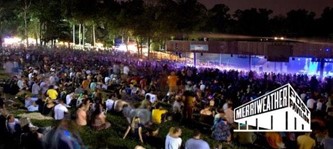
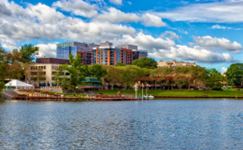
So, it would seem that music and the name, Merriweather, are as inextricably linked as are the culture and lifestyle of this unique Columbia, Maryland community. Art, architecture, nature, beauty, harmony, opportunity and the enjoyment of life are central qualities envisioned by James W. Rouse some 55-years ago. As Rouse proclaimed, “Better Living By Design.” All of these qualities seem to be reflected within the careful design of this newly reborn Marriott Autograph Hotel. When one looks at the community as a whole, all the dots would seem to connect and converge from this one central historic community location upon which gracefully towers the new Merriweather Lakehouse Hotel.
If you are a current or previous customer and would like to be featured in a Trade Story, please contact us!




